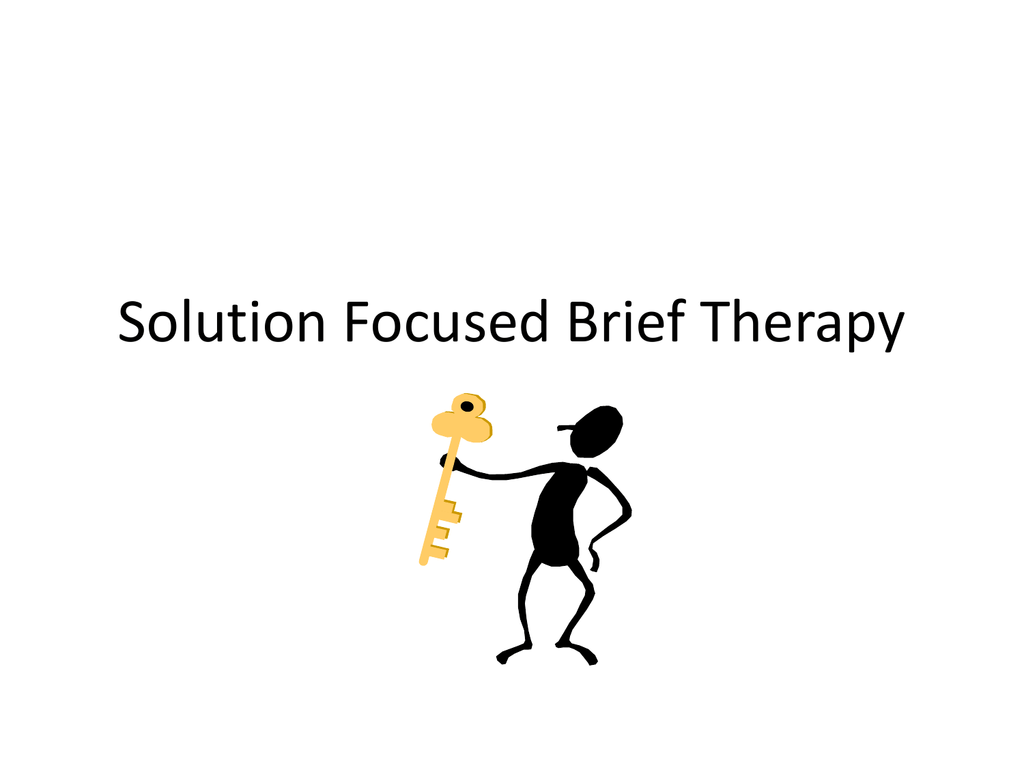Solution-focused therapy is a relatively new form of talk therapy that has been growing in popularity in recent years. It is based on the idea that people are capable of change and growth and focuses on solutions rather than problems. In this article, we will explore what solution-focused therapy is, who it can help, how it works, and some of the benefits associated with it. We will also look at some common concerns and limitations associated with the approach, as well as ways to find a qualified therapist if you decide to pursue this type of treatment.
Contents
Understanding Solution-focused Therapy

SFT is a type of talk therapy that is based on the idea that people are capable of change and growth. The focus of the approach is on solutions rather than problems. This means that instead of dwelling on past experiences or current difficulties, the therapist and client work together to identify goals and develop a plan for achieving them.
Theory Behind Solution Focused Therapy
The theory behind this therapy is that change is possible and that people have the ability to grow and develop. The therapist works with the client to identify goals and create a plan for achieving them. The focus is on the future and on what the client wants to achieve, rather than on past experiences or current difficulties.
History and Development of Solution-focused Therapy
Solution-focused therapy is a relatively new form of talk therapy that has been growing in popularity in recent years. It was developed in the early 1980s by Steve de Shazer and Insoo Kim Berg, who was working as family therapists at the time. The approach is based on brief therapy, which is a type of therapy that focuses on solving specific problems in a short period of time.
Unfolding Solution-Focused Therapy
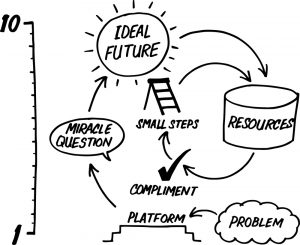
This therapy typically unfolds in four stages:
- Orientation phase: During which the therapist and client discuss the goals of therapy and how they will work together to achieve them.
- Solution-building phase: During which the therapist and client identify the client’s strengths and resources.
- Consolidation phase: During which the therapist and client work together to develop a plan for maintaining the gains made in therapy.
- Termination phase: During which the therapist and client discuss the progress made in therapy and the client’s plans for continued growth.
Who Can It Help
Solution-focused therapy can help people who are dealing with a wide range of issues. It is effective in treating anxiety, depression, substance abuse, eating disorders, and relationship problems. It can also be helpful for people who are struggling with making changes in their life.
How Does It Work
The first thing to understand about solution-focused therapy is that it is based on the idea that people are capable of change and growth. This means that the therapist will focus on solutions rather than problems. The therapist will also help the client to set goals and work towards them. The goal of this therapy is to help the client to make positive changes in their life.
What To Expect
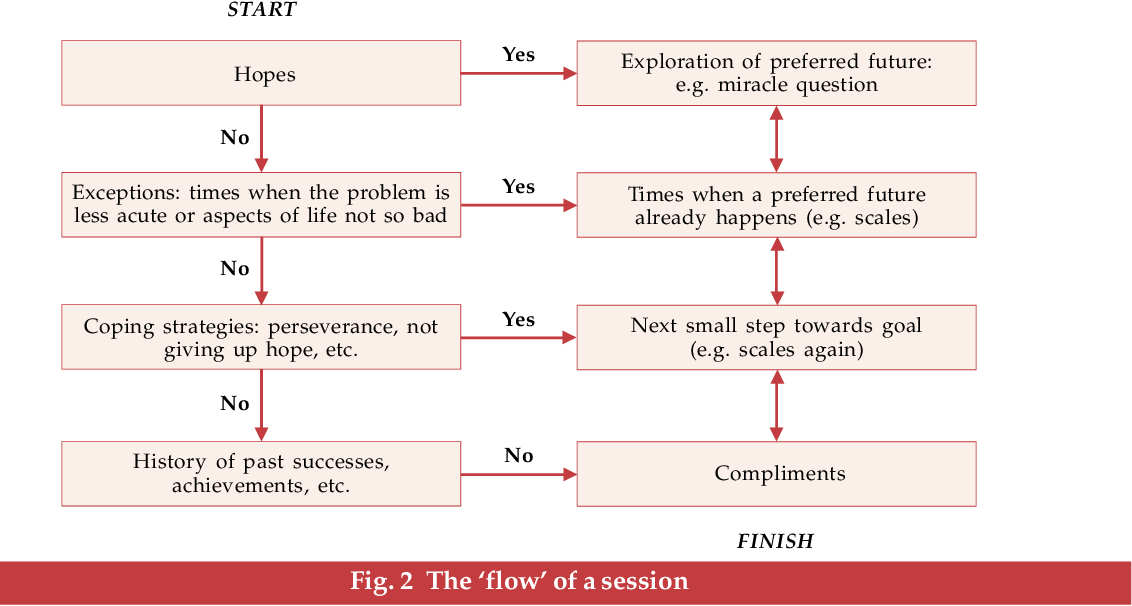
Solution-focused therapy typically consists of a series of sessions between the therapist and client. During each session, the therapist will help the client to identify their goals and work towards them. The therapist will also teach the client skills that they can use to make positive changes in their life.
Techniques Used in Solution-focused Therapy
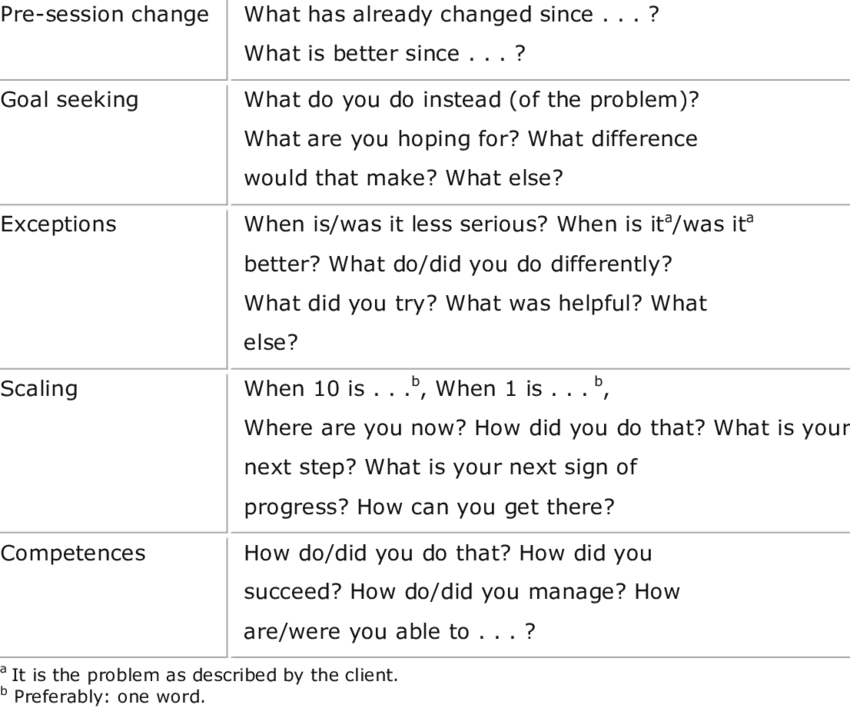
This therapy makes use of several different techniques, including goal setting, solution brainstorming, and scaling.
- Goal setting is a process in which the therapist and client identify specific goals that the client would like to achieve.
- Solution brainstorming is a process in which the therapist and client brainstorm possible solutions to the client’s problem.
- Scaling is a technique in which the therapist and client rate the severity of the client’s problem on a scale from 0 to 100.
Evaluating Solution-focused Therapy
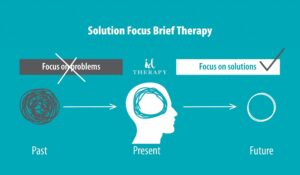
This therapy is an effective treatment for a wide variety of mental health concerns. The approach is particularly helpful in treating anxiety, depression, substance abuse, and relationship problems.
Benefits of Solution-focused Therapy
Solution-focused therapy has several benefits, including its focus on the future and its emphasis on the client’s strengths and resources. The approach is also brief, which means that it can be completed in a relatively short period of time.
Common Concerns and Limitations
Solution-focused therapy is not appropriate for everyone. The approach may not be suitable for people who are dealing with very serious mental health concerns, such as schizophrenia or bipolar disorder. In addition, this therapy requires the participation of both the therapist and the client to be successful.
Why Consider It
This therapy is a brief, solution-oriented approach that is effective in treating a wide variety of mental health concerns. The approach is based on the strengths and resources of the client, and it focuses on the future. If you are looking for a therapy that can help you achieve your goals, solution-focused therapy may be a good option for you.
Finding a Solution-focused Therapist

If you are interested in finding a solution-focused therapist, there are a few things to keep in mind.
- First, it is important to find a therapist who has experience with the approach.
- Second, it is important to find a therapist who you feel comfortable with and who you feel understands your needs.
- Lastly, it is important to find a therapist who is licensed and who has received training in solution-focused therapy.
How To Find One
There are a few different ways to find a solution-focused therapist. Some of these include:
- Ask your doctor for a referral,
- Search online directories, or
- Ask your insurance company.
What To Look Out For
When searching for a solution-focused therapist, there are a few things to keep in mind.
- First, make sure that the therapist is licensed and has received training in solution-focused therapy.
- Second, make sure that the therapist has experience with the approach.
- Lastly, make sure that you feel comfortable with the therapist and that you feel understood.
Red Flags Not To Avoid
When searching for a solution-focused therapist, there are a few red flags to avoid.
- First, avoid therapists who do not have experience with the approach.
- Second, avoid therapists who are not licensed or who have not received training in solution-focused therapy.
- Lastly, avoid therapists who you do not feel comfortable with or who you do not feel understand your needs.
Pursuing Training In SFBT
If you are interested in pursuing training in this therapy, there are a few things to keep in mind.
- First, make sure that the training is provided by an accredited institution.
- Second, make sure that the training is approved by the Solution-focused Brief Therapy Association.
- Lastly, make sure that you feel comfortable with the training and that you feel like it will be helpful for you.
Hearing From Experts
If you are interested in hearing from experts in the field of solution-focused therapy, there are a few places to look.
- The Solution-focused Brief Therapy Association offers a variety of resources, including articles, podcasts, and webinars.
- In addition, the American Psychological Association offers a variety of resources on solution-focused therapy, including articles and podcasts.
Case Study
John is a 38-year-old man who has been experiencing anxiety for the past year. He has been to see several therapists, but he has not found one that he feels comfortable with. John’s friend recommended that he try solution-focused therapy, and so he decided to give it a try.
John met with his therapist, and they discussed his goals for therapy. John’s therapist explained the approach to him, and they worked together to develop a plan. Over the course of several weeks, John and his therapist worked together to help him achieve his goals. John was able to reduce his anxiety and improve his life.
Resources
If you are interested in learning more about this therapy, there are a few resources that you can use.
- The Solution-Focused Brief Therapy Association offers a variety of resources, including articles, podcasts, and webinars.
- In addition, the American Psychological Association offers a variety of resources on SFBT, including articles and podcasts.
Conclusion
SFBT is a brief, solution-oriented approach that is effective in treating a wide variety of mental health concerns. If you are looking for therapy that can help you achieve your goals, this therapy may be a good option for you.
A Word From Therapy Mantra
Your mental health — Your psychological, emotional, and social well-being — has an impact on every aspect of your life. Positive mental health essentially allows you to effectively deal with life’s everyday challenges.
At TherapyMantra, we have a team of therapists who provide affordable online therapy to assist you with issues such as depression, anxiety, stress, workplace Issues, addiction, relationship, OCD, LGBTQ, and PTSD. You can book a free therapy or download our free Android or iOS app.
